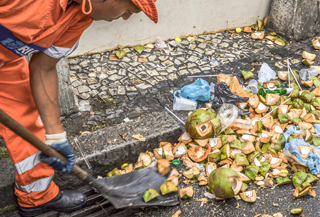Implement a financial, social and environmental solution to treat the organic fraction of Rio de Janeiro’s waste, which represents over 50% in weight of total household waste stream.
RIO DE JANEIRO, BRAZIL

Population
6,476,631 (2015)
GDP
201 billion USD (2008)
Project area
Solid waste management
GHG from waste
1,706.58 Metric Tons CO2e (2012)
THE PROJECT
Rio de Janeiro is looking to establish new and innovative solutions for managing the disposal of Municipal Solid Waste (MSW). The treatment and final disposal of MSW has been a challenge for most Brazilian municipalities, with 41.6% of all MSW generated in the country being disposed of improperly. The city of Rio de Janeiro will use the City Solutions Platform (CSP) to implement a financial, social and environmental solution to treat the organic fraction of its waste, which represents over 50% in weight of total household waste.
In Brazil, there are very few initiatives to treat the organic fraction of MSW, diverting this residue from landfill and avoiding its environmental liabilities (leachate and biogas production). COMLURB is currently building and implementing a pilot plant, which aims to establish the first national technology for the treatment of organic fraction of MSW with biogas and composting production (biomethanization in tunnels), linking sanitation to power generation. The plant is already under construction and is planned to be operational by December, 2016.
The pilot project results from a partnership between academia, the public and private sectors (COMLURB, the Brazilian company Methanum, and a public University (UFMG)). The National Development Bank (BNDES) is funding the project. The main challenge is the technical and economic feasibility of the technology developed in the pilot project. If proven to be technical and economically feasible, this technology could be installed at plants with similar capacities in hundreds of municipalities in developing countries. The system is also being configured as a teaching and research platform, allowing, in addition to academic and professional training, the continuous process of technological development and optimization of the overall performance of the treatment system.